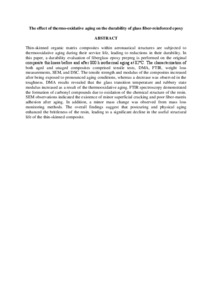Citation
Khajeh, Amin and Mustapha, Faizal and Hameed Sultan, Mohamed Thariq and Banhegyi, Gyorgy and Karacsony, Zsuzsanna and Baranyai, Viktor
(2015)
The effect of thermo-oxidative aging on the durability of glass fiber-reinforced epoxy.
Advances in Materials Science and Engineering, 2015.
art. no. 372354.
pp. 1-13.
ISSN 1687-8434; ESSN: 1687-8442
Abstract
Thin-skinned organic matrix composites within aeronautical structures are subjected to thermooxidative aging during their service life, leading to reductions in their durability. In this paper, a durability evaluation of fiberglass epoxy prepreg is performed on the original composite thickness before and after 800 h isothermal aging at 82°C. The characterization of both aged and unaged composites comprised tensile tests, DMA, FTIR, weight loss measurements, SEM, and DSC. The tensile strength and modulus of the composites increased after being exposed to pronounced aging conditions, whereas a decrease was observed in the toughness. DMA results revealed that the glass transition temperature and rubbery state modulus increased as a result of the thermooxidative aging. FTIR spectroscopy demonstrated the formation of carbonyl compounds due to oxidation of the chemical structure of the resin. SEM observations indicated the existence of minor superficial cracking and poor fiber-matrix adhesion after aging. In addition, a minor mass change was observed from mass loss monitoring methods. The overall findings suggest that postcuring and physical aging enhanced the brittleness of the resin, leading to a significant decline in the useful structural life of the thin-skinned composite.
Download File
![[img]](http://psasir.upm.edu.my/46572/1.hassmallThumbnailVersion/The%20effect%20of%20thermo-oxidative%20aging%20on%20the%20durability%20of%20glass%20fiber-reinforced%20epoxy.pdf)  Preview |
|
Text (Abstract)
The effect of thermo-oxidative aging on the durability of glass fiber-reinforced epoxy.pdf
Download (101kB)
| Preview
|
|
Additional Metadata
Actions (login required)
 |
View Item |

